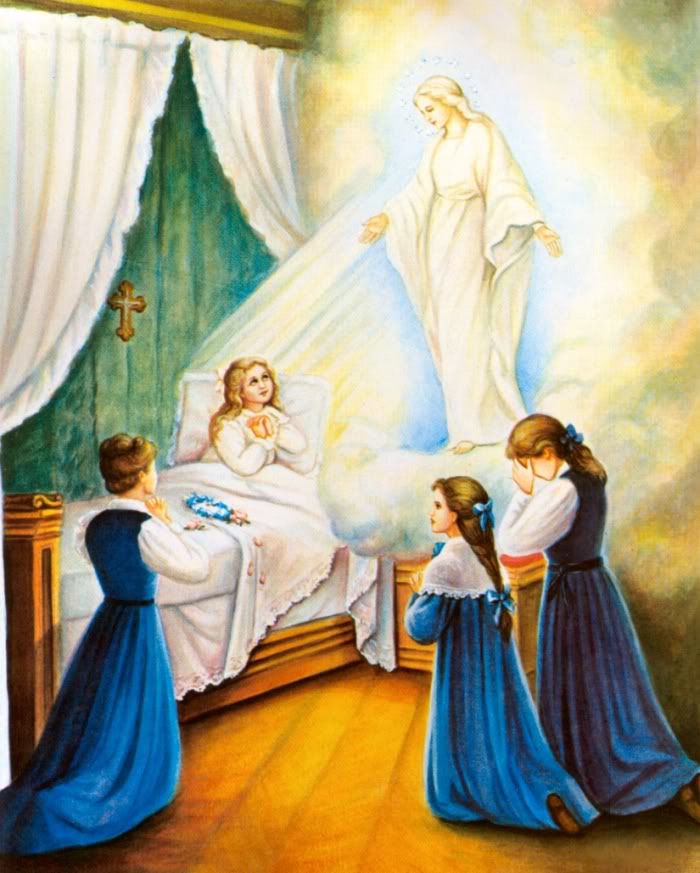 "Our hearts were made for Thee, O Lord, and they shall be restless till they rest in Thee" (St. Augustine).
"Our hearts were made for Thee, O Lord, and they shall be restless till they rest in Thee" (St. Augustine). "Our hearts were made for Thee, O Lord, and they shall be restless till they rest in Thee" (St. Augustine).
"Our hearts were made for Thee, O Lord, and they shall be restless till they rest in Thee" (St. Augustine).
People are sometimes puzzled by the popularity of the Little Flower and inquire, "Why should this little girl Saint attract to herself from all over the world such great multitudes?" Various explanations are given: the charm and sweetness of her life which, like the perfume of roses, cannot be resisted; her unique and attractive promises, "I will spend my heaven doing good upon earth; I will let fall from Heaven a shower of roses;" her favors showered so abundantly upon her devotees.
One other explanation of her popularity, I think, is this: acquaintance with the Little Flower teaches every soul the secret of happiness, and having learned that secret from the words and example of the Little Flower, thousands are full of gratitude to her; they come to love her, and in loving her, they strive to win for her the love of others, who in turn come to love her and repeat the process, and thus her popularity is, partially at least, explained. Perhaps there are some who have not yet learned from the Little Flower her secret of happiness. Let us therefore glance at her life and try to learn that secret.
The Little Flower as a girl was no more indifferent to this world’s pleasures, no less subject to worldliness and pride and vanity than we are. As a little girl she liked to hear herself praised and to hear her beauty remarked. As a girl she was vain of her pretty dresses, eager for earthly friendships and so proud that once when her mother offered her a coin if she would humbly kiss the ground, the Little Flower refused to bend.
Yet the Little Flower was not many years old before she learned the emptiness of dress and praise and of all those things that gave pleasure to her as a mere child. We find her when only ten years of age spending her holidays "thinking," as she said. "Of what do you think?" she was asked, and she answered, "Oh, about God, about the shortness of life and about the length of eternity." She grasped thus early in life this tremendous truth, this secret of happiness, that life is so short and eternity so long that it does not pay to live for the fleeting pleasures of life, but only for the enduring happiness of eternity.
What happened, once she had grasped this truth? This girl, so bright, so charming, so beautiful, so talented, so blessed with riches that she could have had the best the world could offer her, turned her back upon the world and entered the Carmelite convent, henceforth to live under a rule which is the most severe and austere of all the rules of religious orders. She took this step not because she did not know or appreciate what the world had to offer her and what pleasures were open to her outside the convent, but because she had learned, what many of us will never learn until we are on our death beds, that mere pleasure in any form will never satisfy the heart of man. She said to herself, "Since this world passes and with it all its cares and anxieties, all its joys and sorrows, all its hopes and wishes; since it passes and with it all those who dwell therein, whether they have met with its frowns or its smiles, whether they have experienced its evil or its good; since all that concerns me thus passes, what is worth my solicitude here except to love God and labor for eternity?" She entered the convent because she was convinced that this world’s pleasures cannot give full happiness to any creature and because she was convinced that to be in the close friendship of God is the greatest happiness possible in this world.
Let us briefly demonstrate that the Little Flower was right in her decisions. That worldly pleasures, even those that are not sinful, cannot satisfy the longings of the human heart is a matter of so common experience that we need not demonstrate it here. Pleasures of every kind pass quickly and leave a void. Men and women of great wealth and capacity for pleasure are not distinguished for happiness, as you know. Ask any man, who has been a pleasure-seeker and a luxury-lover and has then turned more completely to God’s service in mortification and self-denial—ask such a man when he was happier, in indulging his passion for pleasure or in practicing mortification for the love of God, and he will tell you that there was no solidity, no permanence, no depth to his former pleasures, whereas now he is experiencing the greatest happiness earth can give him, namely the consciousness of following closely in the footsteps of Him Who said, "If any man would come after Me, let him take up his cross and follow Me."
What is true of legitimate pleasure is much more true of sinful pleasure. How many of us are there who have had to learn by experience that sinful pleasures bring bitterness, disheartening bitterness, instead of the happiness they promise? Who does not know that an accusing conscience takes all the joy out of the pleasures that stolen money will buy? Who does not know that sins of the flesh instead of bringing happiness give way very quickly to remorse and wretchedness and shame. Such sinful pleasures mean dead innocence and memories full of bitterness of the consciousness of sin. And never is this bitterness more disheartening than in the case of one who has been serving God well, basking in the sunshine of God's smile, when suddenly, through pride or carelessness, or neglect of prayer, the storm of sin breaks and leaves destruction in its wake. Then the poor soul awakes and, viewing the wreck of its happiness, knows then what it should have known before—that there is no happiness in this world except the consciousness of being in the friendship of God. Oh no, sinful pleasure never yet satisfied the sinner's heart. So we might go down through the list of worldly pleasures and find not one nor any combination of them that will satisfy the heart of man. As St. Augustine says, "Our hearts were made for Thee, O Lord, and they shall be restless until they rest in Thee."
My dear friends, let us imitate the Little Flower in her correct estimation of the worth, or rather the worthlessness of earthly pleasures. Not all can imitate her in leaving the world and entering the convent; but those of us called to live in the world can imitate her by acting upon the principle that, although the legitimate pleasures of this life should have a place in our lives, this place is second, not first. God must come first. In our pursuit of innocent pleasures, God must never be neglected.
We can imitate the Little Flower in other ways also. For instance, let us not envy those who are better able to provide themselves with earthly pleasures than we are. They are not happier than we, but they are in more danger. There is comfort in these thoughts for those who have lost fortune or health; for they have lost but earthly goods. Their misfortune or illness is short, and Heaven is before them. Instead of envying the healthy, the wealthy, the pleasure-mad, the "successful" men and women of the world, the true followers of the Little Flower, in imitation of St. Therese, are content with what God sends, are not too eager for innocent pleasures because they have learned from her, to use the words of the Novena Prayers, "the difference between the passing things of time and the joys that never end." They have learned "to be dissatisfied with all that ends with time" and to fix their eyes upon Heaven in imitation of the Little Flower.
St. Therese went through life as in her childhood she passed through the fields, under the stars, in walks which she describes in these words: "I would ask my father to lead me on through the fields under the stars, and lifting up my head that I might see nothing of this unlovely world, I would walk on gazing at the starry sky." So must we go through life, our eyes fixed not upon the passing things of earth, but upon the eternal joys of Heaven.
 This, thousands have learned from the Little Flower. Thousands seeing the happiness of the Little Flower have learned to seek and find happiness, as she sought and found it, not in pursuing fruitlessly the phantom of pleasure, but in giving our best time and energy to God.
This, thousands have learned from the Little Flower. Thousands seeing the happiness of the Little Flower have learned to seek and find happiness, as she sought and found it, not in pursuing fruitlessly the phantom of pleasure, but in giving our best time and energy to God.
Young men surrounded by the allurements of a pleasure-mad age have looked at the white, unruffled and lovely brow of the Little Flower and have learned from her to find their happiness in peace and purity. Young ladies, formerly completely absorbed in the pursuit of passing popularity and of good times have been caught by the spell of the charm of the Little Flower and have learned from her to give God more of their time and energy. They have thus added to their own charm and beauty of character and increased their own happiness. The afflicted, the sick, the poor, and the unfortunate have learned from her to gaze into eternity and, foreseeing their happiness there, to be content with their earthly lot.
This then is one explanation of the popularity of the Little Flower: she teaches to all who come near her the secret of happiness, namely, to give God first place in our lives and to subordinate all earthly pleasures to Him. That all of us may learn this secret, learn to give God always, and under all circumstances, first place, is our prayer to the Little Flower this day. "Continue to send upon the world a shower of roses, the sweetness of whose perfume will draw all souls from the passing things of time to joys that never end."
Contact us: smr@salvemariaregina.info
Visit also: www.marienfried.com